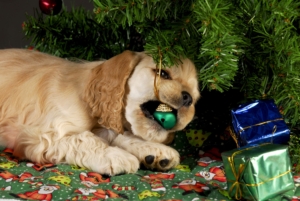Holiday Hazards! Ensuring Your Pet’s Safety During the Holiday Season
The holiday season is a time of joy and celebration, but it’s also a time when our furry friends can be exposed to a myriad of potential hazards. From tempting treats to festive decorations, the holidays pose unique challenges to pet owners. Here are some essential tips to ensure your pet’s safety before, during, and after the holidays!
The Perils of Holiday Foods
🐾 Fatty Foods
Many of us indulge in rich, decadent foods during the holiday season. However, sharing these treats with our pets can lead to health complications. Consuming fatty foods can cause pancreatitis, a painful inflammation of the pancreas resulting in vomiting and diarrhea in dogs. Both dogs and cats can also experience an upset stomach from eating anything out of their regular diet.
Tip: If you want to treat your pet during the holidays, opt for clean whole muscle meat proteins (such as a chunk of turkey removed of bones, seasoning, and skin) or other clean whole-food items that are safe for pets. When in doubt, a quick internet search will often let you know what ingredients are safe vs those that pose a health risk.
🐾Chocolate and Sweets
Chocolate, a favorite holiday treat for many, is toxic to both dogs and cats. The theobromine in chocolate can cause hyperexcitability, nervousness, vomiting, diarrhea, and even death. Sugar-free candies and pastries often contain xylitol, a sugar substitute that can cause low blood sugar levels and liver failure in dogs.
Tip: Keep your chocolate and sweets out of your pets’ reach and make sure to secure the lids on garbage cans where these might be discarded.
🐾Onions and Garlic
Onions and garlic can damage red blood cells and cause anemia in dogs and cats when consumed in copiously large amounts. Therefore, it’s essential to keep these foods, whether raw, cooked, chopped, or powdered, out of your pet’s reach.
Tip: Always monitor your pet during meal times, and ensure all food items are stored securely out of reach of your pets.
Beware of Festive Plants
🐾 Poinsettias
While poinsettias are a popular holiday decoration, they can cause mild oral irritation and gastrointestinal distress if ingested by your pet. Though their toxicity is relatively low, it’s best to keep these plants out of your pet’s reach.
🐾 Mistletoe and Holly
Mistletoe can cause gastrointestinal upset and cardiovascular problems in pets. Holly, when ingested, can also induce nausea, vomiting, and diarrhea. Even non-toxic plants can cause vomiting, choking, and diarrhea if too many are ingested.
Tip: Consider using pet-safe artificial plants made from silk or plastic for your holiday decorations.
Dangers of Holiday Decorations
🐾 Ornaments
Holiday ornaments can seem like toys to our furry friends. Glass ornaments can cause injuries if broken, and swallowed ornaments with sharp or jutting points can cause intestinal blockage and/or damage.
Tip: Opt for durable plastic, wood, or metal ornaments over breakable glass ones, and/or consider putting any ornaments that could pose a health risk up higher on the tree, out of easy reach of your pets.
🐾 Tinsel and Ribbons
Tinsel and ribbons are especially attractive to cats, but can also attract dogs as well. If ingested, they can cause intestinal blockage, a life-threatening condition requiring immediate veterinary attention and intervention.
Tip: To ensure your pet’s safety, it’s best to avoid decorating with tinsel and ribbons altogether. If you must, consider blocking off your tree or decorated area with gates or pet barriers.
🐾 Electrical Cords
Electrical cords for holiday lights can pose a threat to pets who love to chew. Chewing on live electrical cords can cause oral burns, seizures, and even death.
Tip: Keep cords out of reach by using cord protectors, taping them to walls, or hiding them behind furniture.
The Risk of Alcohol & Medications
🐾 Alcohol & Medications
Alcohol can be poisonous to pets, potentially leading to a coma and/or death. Similarly, medications found in guests’ bags can be harmful if ingested by pets.
Tip: Make sure to keep all alcohol and medications securely stored away from your pets.
Managing Holiday Stress
The holiday hustle and bustle can also affect our pets. Changes in routine, increased noise, and new faces in the house can all contribute to stress in our pets. Symptoms of related stress can include loss of appetite, GI distress, or even aggressive behavior that seems out of character for your pet.
Tip: Maintain your pet’s regular routine as much as possible and provide them with a quiet and safe space to retreat to during festive gatherings.
Final Thoughts
By being mindful of these potential hazards and taking the necessary precautions, you can ensure a safe and enjoyable holiday season for your furry friends. Remember, the best gift you can give your pet this holiday season is the gift of safety.

